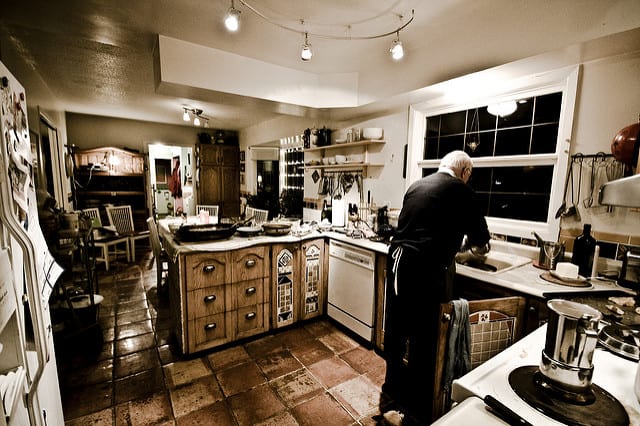My grandparents would speak in Polish when they didn’t want us to understand what they were saying, mostly when they were fighting about something. When my grandmother, Babci, wanted to get under my grandfather’s skin she would translate for us: “Dziadzi doesn’t think I should be over-feeding you.” He’d grumble something in Polish and then she’d smile at us and deliver the final punch: “And now he’s upset with me.” He’d roll his eyes, frustrated by her refusal to keep things between them, get up from the table, and walk to the kitchen sink to start washing dishes.
I wondered sometimes if this was her goal from the beginning. If so, it was a winning strategy. She’d spoon another meatball onto our plates and he’d get started on the pots and pans. In the end, I think everyone was happy. She could over-feed her grandkids and he could gaze out the window at his grapefruit tree, remembering again the quiet goodness of peace and productivity.
They died many years ago now, but their love continues to help me make sense of the strange joy of Easter, the consoling joy of the resurrected Christ, the complicated joy of a life and love that carries on long after the feasting and the flowers. We easily forget it, but the Easter season stretches on for a full fifty days after Holy Week. And Easter joy, like any true love, is not all chocolate and bunnies, but something more like the humble fidelity of washing dishes or the small triumph of an extra meatball for your grandkids.
***
When I was a novice our community hosted a group of Jesuits preparing to take their final vows. Part of this preparation includes a repetition of the so-called ‘experiments’ of the novitiate – the 30-day retreat, the hospital visits, the study of Jesuit history, and the ‘little works’ of communal living, perhaps the most ubiquitous of these being dish duty.
For these men, you got the sense that returning to this simple work after many years was an experience filled with a mix of gentle humiliation and playful nostalgia. Some would, like my Polish grandfather, respond to this regression with quiet perseverance, silent and serious, getting the job done. Others, like Fr. Kim from the Philippines, actually seemed to enjoy it.
Fr. Kim wore a smile on his face as if washing dishes was his favorite pastime, as if every dirty dish were another transfiguration, and even more so when he was assigned to pots and pans. While other duties had their particular rhythms, pots and pans was always a long uphill climb to the finish. This job involved scrubbing away while everyone else kept piling up the many pots and pans used to prepare the meal; and then the serving dishes; and then whatever else didn’t fit in the last cycle of the industrial dishwasher. Fr. Kim’s response to every new arrival, every new pot, or tray, or pitcher, or whatever, was always the same. He’d smile wide and exclaim in a loud singing voice, as if he’d just won the lottery, “More joy!”
I think it began as a kind of self-motivation – the power of positive thinking – but it quickly converted into a sincere calling card of joy. And it was contagious. We would deliver new pots and pans to him and join in his singing exclamation – More joy! Initially we’d be laughing at the irony of it, but we’d be laughing. I recently asked a novitiate classmate of mine about this memory and he said, “More joy? Well I guess it was a better response than, This sucks!”
Long after Fr. Kim returned to Manilla and the ‘remember when we were novices’ playfulness was replaced by the ‘we’re still novices’ sad trombone, we’d occasionally recall his joyful presence. Someone would drop an extra task on us, another pot to scrub, another toilet to clean, another ‘little work’ and we’d smile at each other and exclaim in unison, More joy!
***
How are we to understand the resurrection? How are we to know the truth of Easter? I think the trick is spending time in places where the holy breaks through in the ordinary.
In her wonderful book, For the Time Being, Annie Dillard observes a maternity nurse who spends her days in a crowded city hospital bent over a double sink washing and swaddling babies like dishes. Dillard describes the scene as a meeting of newborn alertness and wizened pragmatism – the miraculous infant with ‘bottomless eyes’ and nothing more than a sudden and total awareness; the hardworking nurse with sure hands and a job to do. The task is repetitive and the magic will soon pass:
In a few hours, this oracular newborn here in the hospital will lose her alertness. She will open her eyes infrequently. She will be quite obviously unable to focus. Her glee will come later, if she lives, and her love later still. For now, she will sleep and cry and suck and be wonderful enough.
The nurse wipes her forehead on a sleeve. The lights are hot. She reaches for another one.
“Now you,” she says.
It’s a brilliant turn of writing. It’s a wonderful testament to the places where our sacred joy meets our ordinary labor. It’s an authentic description of what paschal joy ought to be about. It reminds me of Fr. Kim and of my Polish grandparents. In each of these there is a deep and persistent love discovered in an ordinary place and carried on in ordinary time – a miracle of attention and a little work.
Such is the newness of the resurrected life. You may not understand everything. You will quickly learn that there is more to do, that there is still too much suffering and loss. But I hope you discover that there is even more joy. It is risen among us. And now? Now you.
–//–
The cover photo, from Flickr user Justin S. Campbell can be found here.


